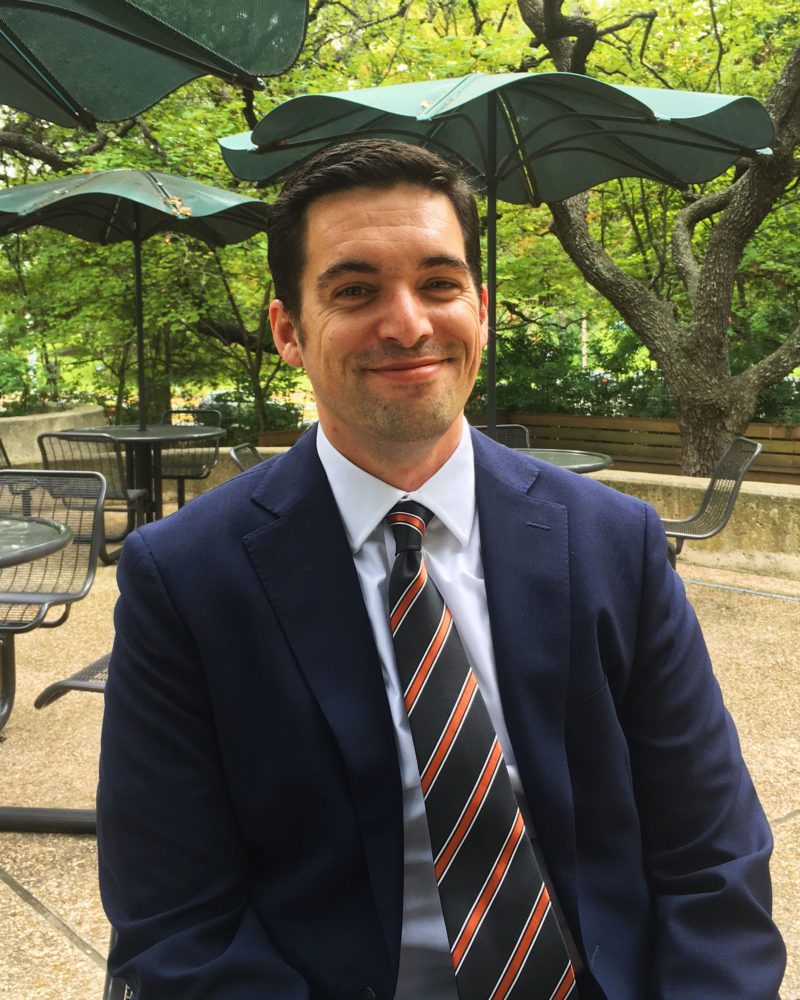Fans of Texas Law’s Instagram and Facebook accounts have already enjoyed getting to know some of our remarkable students through the new Student Spotlight series. Our students have much to say, and, in order to allow them more space than a social media caption, we are bringing the series here to the Texas Law News site!

Without further ado, meet Dustin Farahnak ’20, UTPD Officer and Student Attorney for the Children’s Rights Clinic.
Q: What is your inspiration for coming to law school?
I have a cliché answer: I want to help people. Practicing law is an intellectually challenging, interesting, and powerful way to do it. Years ago, when I worked in Washington D.C., there was a particular bill relating to national security I wanted to be involved with. I started helping with menial tasks while a committee held mark-ups. I made copies and filled water pitchers. I advanced to editing for grammar and clarity. Then legal research. Eventually, I was trusted to draft the results of my research into the bill. After the House of Representatives passed this bill I had actually helped write, I took notes in the conference committee as an exceptionally eager peon. I observed powerful men and women, some wise, some not, negotiating. I got to see how the sausage is really made. What specifically happened in that room is confidential. I left the room amazed by how consequential, and in ways accidental, the results of these deals could be. I also left somewhat jaded with politics, but that developed into an interest in law school. In careful or careless hands, what our laws say and how they are read is important.
Q: Is it true that you used to work as a UTPD officer?
Yes, I did and still do. I plan to both work and study full-time.
Q: Has that had an impact on your approach to studying or thinking about law?
It’s often said that police officers respond to unknowns, reacting in a split second, whereas our partners in the justice system have more time to consider details with care. Most of my critical calls have been mental health emergencies usually with UT students or homeless around campus, some with fulfilling outcomes, and some with the most tragic outcomes. These situations are part of a bigger picture of a mental health system that isn’t well equipped to solve these problems. Police officers must make it work anyway, every day, without losing themselves to the body’s natural inclination to try to dial down emotional investment and protect itself from stress over time. Police are there to address problems in society and should be held to a high standard of honesty and empathy, but they shouldn’t be a band-aid on long-term systemic problems.
Many black and white situations on paper are not clear at all in person. As I study law and engage with attorneys, it’s clear that many laws were written with the best of intentions, but their accidental consequences are overlooked or tolerated for many years. Through understanding and a drive to truly administer justice, lawyers can make a tremendous difference in setting these matters right.
Q: What has been one of the standout experiences of law school so far?
Doing the Children’s Rights Clinic. Focusing on the needs of each of my clients, children whose situations range from problematic to heartbreaking, gives me an incredible sense of purpose. As a student attorney, repeatedly appearing before court to argue my client’s position is the most valuable educational experience I’ve had. The co-directors are firm and patient in explaining how to advocate and how to solve problems in an imperfect system. There is no substitute for real-world, hands-on experience in a courtroom.
